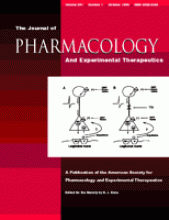Abstract
1′,1′-Dimethylheptyl-Δ-8-tetrahydrocannabinol-11-oic acid (CT-3) is a novel cannabinoid that is under development by Atlantic Pharmaceuticals as an anti-inflammatory and analgesic drug. The objective of the study was to investigate the effects of CT-3 on overt symptom complex (Irwin’s test), nociception, gastrointestinal (GI) ulceration, and pharmacological availability after intragastric (i.g.) and intraperitoneal (i.p.) administration. Analgesic studies were assessed in the hot-plate (55°C) and the tail clip tests in mice and in the tail clip test in rats. In addition, pharmacological interaction of CT-3 with the solvent dimethyl sulfoxide (DMSO) was investigated in rats. In mice, CT-3 decreased spontaneous motor activity and induced dose-dependent, analgesic activity in the tail clip and hot-plate tests, with potency similar to morphine sulfate after i.g. and i.p. administration. However CT-3 showed more prolonged duration of analgesic action than morphine. In rats, CT-3 showed marked analgesia in the tail clip test and had similar i.p. and i.g. median effective dose (ED50 values; 5 mg/kg). CT-3 was devoid of GI ulceration when administered with DMSO either acutely at doses below 100 mg/kg or chronically at a dosage of 30 mg/kg/day for 5 days. In contrast, indomethacin induced GI ulceration and deaths. The concurrent use of DMSO with CT-3 decreased its analgesic action, increased its adverse central nervous system effects, and induced GI ulceration. The evidence indicates that CT-3 exhibits a large dissociation between its anti-inflammatory/analgesic effects and its ulcerogenic actions. CT-3 warrants clinical development as a novel anti-inflammatory and analgesic drug.
Footnotes
-
Send reprint requests to: Esam Z. Dajani, Ph.D., F.A.C.G., International Drug Development Consultants Corporation, 1549 RFD, Long Grove, IL 60047-9532. E-mail: esamd{at}aol.com
-
↵1 This research was funded by Atlantic Pharmaceuticals, Inc. (Raleigh, NC). The authors also acknowledge additional support received from the International Drug Development Consultants Corporation and the Department of Research of the Salt Lake Veterans Administration Medical Center.
- Abbreviations:
- CT-3
- 1′,1′-dimethylheptyl-Δ-8-tetrahydrocannabinol-11-oic acid
- i.g.
- intragastric
- i.p.
- intraperitoneal
- THC
- Δ-9-tetrahydrocannabinol
- DMSO
- dimethyl sulfoxide
- MC
- methylcellulose
- GI
- gastrointestinal
- NSAID
- nonsteroidal anti-inflammatory drug
- Received August 12, 1998.
- Accepted March 2, 1999.
- The American Society for Pharmacology and Experimental Therapeutics
JPET articles become freely available 12 months after publication, and remain freely available for 5 years.Non-open access articles that fall outside this five year window are available only to institutional subscribers and current ASPET members, or through the article purchase feature at the bottom of the page.
|






